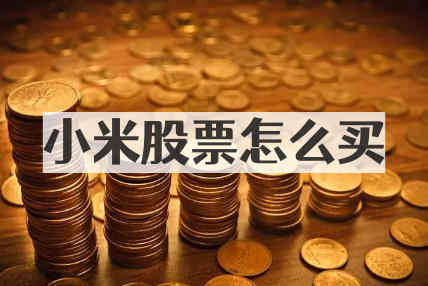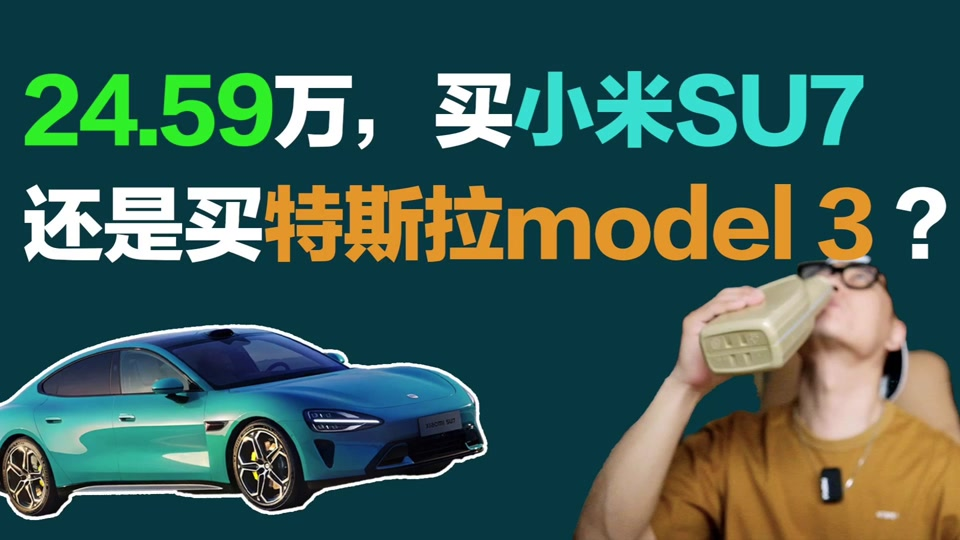- Remittance
- Exchange Rate
- Stock
- Events
- EasyCard
- More
- Download
- Creator

Xiaomi Car Goes Public: Can Xiaomi Stocks Surge Like Tesla's Over Ten Years? A Guide for Veteran Inv
On March 28, 2024, Lei Jun held a press conference for Xiaomi Car, finally setting its price. The Xiaomi Car SU7 ranges from 212,900 to 299,900 yuan, realizing the dream of building a car in three years.

Many entrepreneurs have failed in car manufacturing, but Lei Jun succeeded
In China’s business realm, Lei Jun is undoubtedly an admirable entrepreneur. His Xiaomi Group has achieved tremendous success in the smartphone market and bravely ventured into the challenging and uncertain automotive industry. Recently, many renowned entrepreneurs have entered the car manufacturing sector, but many have not achieved the anticipated success. Dong Mingzhu’s Gree Car project, after nine years of research and development and an investment of up to 80 billion yuan, failed to achieve commercial production. Jia Yueting’s Faraday Future, despite its grandeur, faced financial difficulties and production challenges after nine years and an investment of 50 billion yuan. Xu Jiayin’s Evergrande Auto, after investing nearly 100 billion yuan in just three years, encountered troubles due to a broken capital chain. Apple’s CEO Tim Cook also considered expanding into car manufacturing, reportedly investing about 10 billion USD in related R&D, but the project was seemingly abandoned.
There are also many successful car-making entrepreneurs, but their stock prices have been less satisfactory
Li Auto, NIO, and Xpeng Motors are three star enterprises in China’s new energy vehicle industry, achieving notable success in the market, but their stock performance has not fully reflected this success.
Li Auto, since its Nasdaq listing in July 2020, experienced initial price increases followed by significant market value fluctuations. Initially, Li Auto was enthusiastically pursued by investors, with its price soaring. However, it later faced a pullback due to overall market volatility and increased industry competition.
NIO, another leader in China’s electric vehicle market, has seen significant price fluctuations since its NYSE listing in September 2018. NIO’s initial stock performance was not ideal, but it surged in late 2020, becoming a darling of the capital market. Despite this, NIO’s stock price later faced downward pressure, reflecting the market’s complex view of its long-term growth potential.
Xpeng Motors, listed on the NYSE in August 2020, saw its stock price quickly rise, surpassing many traditional car manufacturers in market value. Xpeng gained market attention with its innovations in intelligent driving and electric vehicle technology, but its stock price also showed considerable volatility, reflecting diverse investor opinions on its performance growth and market competitive position.
How do stock investors view Xiaomi stocks?
Xiaomi Group’s stocks have been widely followed since their listing. As the Xiaomi Car’s IPO plan became clearer, investors on major brokerage platforms like Tiger Brokers, Futu Securities, or BiyaPay engaged in intense discussions, expressing different views on the future trend of Xiaomi stocks.
Tiger Brokers and Futu Securities are traditional brokerages, while BiyaPay is a wallet supporting USD or USDT deposits for trading Bitcoin, U.S. stocks, Hong Kong stocks, and foreign exchange. Investors on these platforms generally fall into two categories.

Some investors are optimistic about Xiaomi stocks, believing that the IPO of Xiaomi Car will bring new growth momentum to Xiaomi Group. They point out that Xiaomi has already established a strong brand and market share in smartphones, smart homes, IoT, and consumer electronics. The addition of the automotive business could further expand Xiaomi’s ecosystem and enhance its competitiveness in high-tech fields. Therefore, they expect significant gains in Xiaomi stocks in the future.
On the other hand, some investors are cautious or pessimistic about Xiaomi stocks, thinking that the complexity and high investment in car manufacturing, along with intense market competition, could pressure Xiaomi’s financial status and profitability. Moreover, these investors worry that current global economic uncertainties and supply chain issues could affect the development of Xiaomi’s automotive business and stock performance. Thus, they believe Xiaomi stocks may not perform well in the short term.
How can trading novices buy Xiaomi stocks, and how to choose the right brokerage?
After the IPO of Xiaomi Car, many investment beginners are eager to buy Xiaomi stocks, with many brokerages supporting Xiaomi stock transactions, such as Interactive Brokers, Charles Schwab, and BiyaPay. Beginners can simply open an account on these platforms.

For investment novices, understanding the advantages and disadvantages of each brokerage platform when buying and selling Xiaomi stocks is crucial. An analysis of Interactive Brokers, Charles Schwab, and BiyaPay follows:
1.Interactive Brokers (IB)
Advantages:
- Global trading: IB provides access to stock markets in many countries and regions, suitable for global investors interested in Xiaomi stocks.
- Low costs: Known for low trading fees and financing costs, beneficial for frequent traders.
- Advanced trading tools: Offers sophisticated platforms and tools like chart analysis, market data, and risk management.
Disadvantages:
- Complexity: Advanced features may make the platform too complex for beginners.
- Minimum account balance: Opening an account may require a certain minimum balance, a potential barrier for budget-limited novices.
2.Charles Schwab
Advantages:
- Comprehensive investment services: Offers a wide range of financial products, including stocks, bonds, funds, and others.
- Strong research support: Provides extensive market research and analysis tools to help investors make informed decisions.
- Customer service: Known for good customer service, offering support for novice investors.
Disadvantages:
- Account minimums: May require a higher minimum account balance or investment amount.
- Fee structure: Some services may have higher fees.
3.BiyaPay
Advantages:
- Supports digital currency USDT for trading U.S. and Hong Kong stocks: Allows trading with USD or USDT, enabling transactions without a U.S. bank account.
- User-friendly: Designed for novice investors, with a friendly interface and simplified trading process.
- Cryptocurrency and stock trading: Supports both cryptocurrency and traditional stock market trades, suitable for investors interested in diversified investments.
- No minimum deposit: Allows trading U.S. and Hong Kong stocks or Bitcoin with as little as one USD or USDT.
Disadvantages:
- New platform recognition: As a newer platform, it may lack the broad recognition of established brokerages. However, BiyaPay is well-regarded in the Bitcoin trading community for supporting both Bitcoin and stock investments on a single platform.
- Market scope and product depth: May have limited product depth and market coverage compared to traditional brokerages.
In summary, each platform has its unique advantages and potential limitations. Investors should consider their investment needs, experience level, and risk tolerance when choosing a brokerage, and may need further research or professional advice to make the best choice.
Can Xiaomi stocks surge like Tesla’s over ten years?
The IPO of Xiaomi Car is a significant event in the technology and automotive industries, leading many investors and market observers to ponder whether Xiaomi stocks could achieve a hundredfold growth over the next decade, similar to Tesla. The answer to this question involves multiple aspects, including market positioning, technological innovation, industry environment, and company strategy.

1.Market Positioning and Brand Strength
Xiaomi, as a comprehensive electronics technology company, has built a strong brand and market share in smart phones, smart homes, consumer electronics, and more. The launch of Xiaomi Car represents a new step in Xiaomi’s high-tech ecosystem. Transforming existing brand strength and customer base into a competitive advantage in the automotive field is a significant challenge and opportunity for Xiaomi.
2.Technological Innovation and Competitiveness
Tesla’s stock’s remarkable growth over the past decade is largely attributed to its revolutionary innovations and market-leading position in electric vehicle technology. Whether Xiaomi Car can bring breakthrough innovations in battery technology, autonomous driving, and connected cars will be key to its stock’s potential for significant growth.
3.Industry Environment and Policy Support
The development of the electric vehicle industry is driven by global environmental policies and technological advancements. Government subsidies for electric vehicles, restrictions on traditional fuel cars, and investments in new energy vehicle infrastructure positively impact the growth of electric vehicle companies. Xiaomi Car’s success depends not only on the company’s efforts but also on the industry’s development trends and policy environment.
4.Company Strategy and Execution
The long-term success of Xiaomi Car also relies on the company’s strategic planning and execution. Whether Xiaomi can establish strong R&D, production capabilities, supply chain management, and marketing strategies in the automotive sector will directly impact its market performance.
5.Investor Perspective
For investors, assessing the future growth potential of Xiaomi stocks requires considering these multiple factors. While Xiaomi’s success in the electronics technology field provides a foundation for entering the automotive industry, the complexity and competitive intensity of the automotive sector mean success is not guaranteed. Investors should closely monitor Xiaomi’s strategic layout in the automotive sector, technological innovation, market response, and the overall development trend of the electric vehicle industry.
Overall, the IPO of Xiaomi Car opens new growth avenues for the company and offers new investment opportunities for investors. However, whether it can replicate Tesla’s stellar performance over the past decade remains to be seen. For Xiaomi and its investors, the future is full of challenges and possibilities, making ongoing observation and analysis an indispensable part of the investment decision process.

























